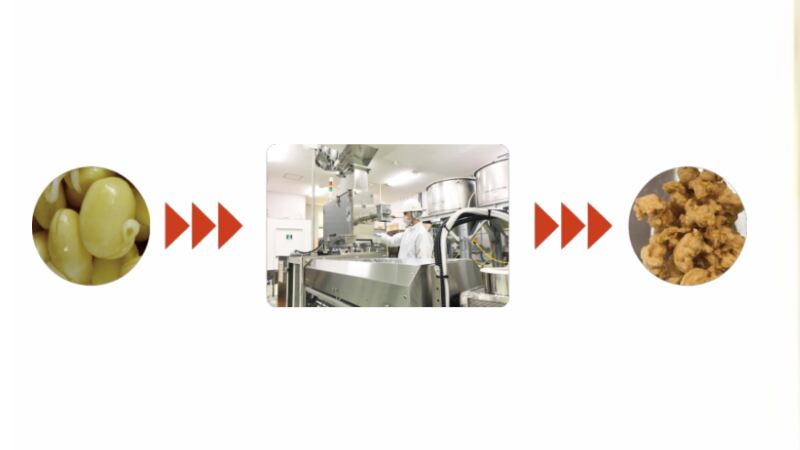DAIZ’s patented technology is called the Ochiai Germination Method (OGM), which focuses on using germinated high oleic acid soybeans as a base ingredient.
“The free amino acid composition of germinated soybeans has been found to [already] be similar to that of meat, and our OGM technology adjusts parameters such as oxygen, carbon dioxide, temperature, and humidity during the soybean germination process to obtain a taste composition that is [even more meat-like],” DAIZ CTO Koji Ochiai told FoodNavigator-Asia.
“[This is done by] inducing enzymatic activity under stressful (high carbon dioxide) growth conditions to activate additional [molecules] in the soybeans that are not found in the ordinary germination process, [freeing] amino acids and taste-related molecules to increase both deliciousness and nutritional value.
“Amino acids that are related to taste such as glutamic acid, aspartic acid, and alanine are brought closer to the free amino acid composition of meat [so as to make the product even more meat-like].
“Furthermore, by adjusting the germination conditions to change the amino acid composition, it is possible to modify Miracle Meat to create [flavours] similar to that of pork, chicken, beef, and fish.”
To even more closely replicated the texture of meat, DAIZ uses OGM in combination with a specialized extruder machine, where a ‘twin-screw extruder’ process enables meat-like texture to be recreated without adding any additives.
“The high pressure and temperature is the key to the fiberisation and orientation of the proteins in the germinated soybeans [to resemble a meat structure],” said Ochiai.
The firm is currently also more soybean varieties and germination conditions to create more types of flavours and textures, so more types of meats could well be on the horizon, especially as DAIZ is looking to first position its Miracle Meat as a solution for various plant-based meat producers.
“Consumers cannot yet directly purchase Miracle Meat at the supermarket right now, [as] DAIZ is currently focused on B2B, [but] we anticipate there will be [a wide] variety of plant-based meat products based on Miracle Meat that sold at supermarkets and restaurants [made available to them first],” said Ochiai.
Soybean ‘off-flavour’ solution
In addition to meat-like flavour and texture, the germinated soybeans also stand out for being naturally enhanced in umami flavour, removing the need for any additional flavourings.
“Miracle Meat is already flavourful [which] eliminates the need [to include] additives, and manufacturers are also able reduce their cost of production,” Ochiai added.
“The existing soybean and other grain-derived raw materials [used in other] plant-based meat products are known to have a soy ‘off-flavour’ odour and lack texture, [so] manufacturers mask these by adding spices and using expensive binders to enhance the texture.
“Some overseas competitors also use fermentation to improve the umami flavour. However, because their products are produced from dregs, they [tend] to face challenges in increasing umami flavour, adding texture, and deodorizing (to remove the soybean ‘off-flavour’ odour).”
The soy ‘off-flavour’ odour is a common challenge for plant-based meat producers working with soybeans, as ordinary soybean fatty acids are rich in linoleic acid and linolenic acid which produce this when oxidised – but DAIZ has also found a solution here.
“DAIZ soybeans are a special non-GMO variety developed by Saga University with very little linoleic acid and linolenic acid [but] high in oleic acid [which does not produce that ‘off-flavour’],” said Ochiai.
“[Overall, the aim is to] eliminate off-flavour and solve the problem of mimicking meat texture [so that] plant-based meat manufacturers will no longer need to add [additives such as] masking agents, binders, and metallic heme iron into their products.”
Future plans
DAIZ ‘s focus is very much on technology and R&D, and this will remain a strong focus for the firm moving forward.
“[A lot of] our research efforts went into understanding the off-flavour mechanism off-flavor of soybeans, where we have analysed over 700 molecules related to taste and aroma, [and even] tried to understand the transmission mechanism of the brain and cerebral physiology as well [in relation to these],” said Ochiai.
“Going forward, we will accumulate data from a variety of meat sources and strive to attain more meat-like products by applying a computational approach.”
The firm also recently secured US$6mn in investment and has plans to launch and operate the first plant-based meat factory in Japan by Fall 2021.
“This factory will increase our production capacity of Miracle Meat to more than 10,000 tons per year (currently, limited to 1,000 tons/year and 3,000 tons/year by end of 2020),” said Ochiai.
“[We] will also expand our distribution channels to the APAC region and North America, and by 2023, our goal is to launch a new factory in the US and achieve an annual revenue of JPY10bn (US$94mn).”
DAIZ is the winner of the Future Food Asia 2020 Plant Protein Award, sponsored by Bühler and Givaudan.
We’ll be shining the spotlight on Plant-based Innovation in our Growth Asia 2020 interactive broadcast series. Register for free here.





